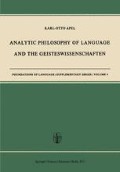Abstract
The name “Analytical Philosophy”, as it is used today, contains an ambivalence of meaning, which, as we shall see, is of paramount importance for the problems to be discussed:
-
1.
It was not actually the ‘analytic’ methods of the sciences under study by “Analytical Philosophy” which gave this philosophy its name; but rather its own method of analysis, that methodical revolution in philosophy which is dominating the Anglo-Saxon world of today.3 This ‘analysis’, however, which is considered so revolutionary, is not applied to the objective facts of science, but rather to the sentences of science, i.e. not to things, but to the language that speaks of these things. “Meaning and Truth”, “Meaning and Verification”, “Language, Truth and Logic” — these are typical titles to be found in the literature of Analytical Philosophy; and the distinction between meaningful and meaningless sentences is the characteristic theme of the Logical Positivist’s critique of metaphysics.
Access this chapter
Tax calculation will be finalised at checkout
Purchases are for personal use only
References
See W. Stegmüller, Hauptströmungen der Gegenwartsphilosophie, 2nd ed., Stuttgart 1960, Ch. X.
Cf. K.-O. Apel, ‘Das “Verstehen”...’, Arch. f. Begriffsgesch. 1 (1955) 172 ff.
See: A. J. Ayer et al.„ The Revolution in Philosophy, London 1957;
J. O. Urmson, Philosophical Analysis, Oxford 1956;
M. J. Charlesworth, Philosophy and Linguistic Analysis, Duquesne University Press, Pittsburgh, Pa., 1961.
Cf. footnote 3.
Cf. footnote 3.
See also J. Hartnack, Wittgenstein and Modern Philosophy, London 1965.
Rights and permissions
Copyright information
© 1967 Springer Science+Business Media Dordrecht
About this chapter
Cite this chapter
Apel, KO. (1967). Introduction. The methodical-methodological ambivalence of Analytical Philosophy of Language pervading the three phases of its historical development. In: Analytic Philosophy of Language and the Geisteswissenschaften. Foundations of Language. Springer, Dordrecht. https://doi.org/10.1007/978-94-017-6316-5_1
Download citation
DOI: https://doi.org/10.1007/978-94-017-6316-5_1
Publisher Name: Springer, Dordrecht
Print ISBN: 978-94-017-5848-2
Online ISBN: 978-94-017-6316-5
eBook Packages: Springer Book Archive

